
Price: $15.65
(as of Feb 12,2023 04:26:33 UTC – Details)
From the Publisher
Explore example projects from Beyond the Garden
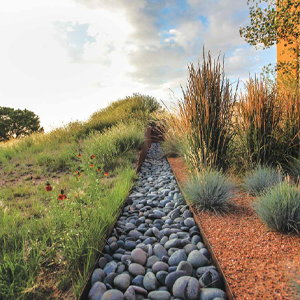

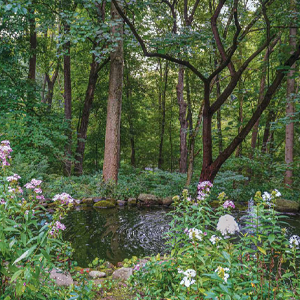

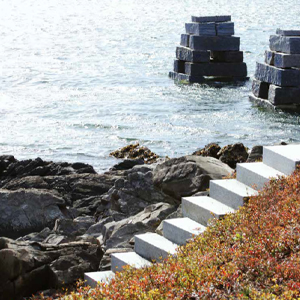

Channeling rainwater in the high desert
Project: Woven Plains
Location: Santa Fe, New Mexico
Size: 2.5 acres
Designer: Surroundings Studio
When Kenneth Francis of Surroundings Studio was brought in to the project, the clients had recently relocated to the high desert from the suburbs of Midland, Texas. Based on years of experience designing in a desert climate, he established a water ethic from the start of the project. The design adapts a centuries-old agricultural technique, known as an acequia, as a piece of modern stormwater infrastructure— a symbiotic irrigation system to support the clients’ desire for a lush, vibrant garden in a semiarid landscape.
Beneficial disturbances in ecological gardening
Project: Millersville Meadows and Garden
Location: Millersville, Pennsylvania
Size: 2.8 acres
Designer: Larry Weaner Associates
Larry Weaner’s work reimagines the potential of the residential garden as an opportunity to support local ecologies by restoring native landscapes and teaching people how to care for them. At the garden in Millersville, a rural enclave west of Philadelphia, the client, a sophisticated horticulturalist, approached Weaner about designing the landscape around their new home, which sits on nearly three acres, using only native species and transitioning to a more ecologically focused approach to maintenance.
Historic preservation in coastal Acadia
Project: Northeast Harbor
Location: Mount Desert Island, Maine
Size: 5 acres
Designer: STIMSON
When Stimson and her team arrived at the site, a fiveacre slice of Charles Eliot’s former 120-acre property, the history embedded in the local ecology had been all but erased. The land had been blasted in preparation for the construction of the new home, leaving a massive hole where a few remaining conifers clung to a thin layer of topsoil sitting on nearly a foot of ledge. The restoration efforts were extensive, unfolding over several years, to mitigate the damage from the blasting and restore the native planting to reflect the ecology characteristic of the area when Acadia first became a national park.
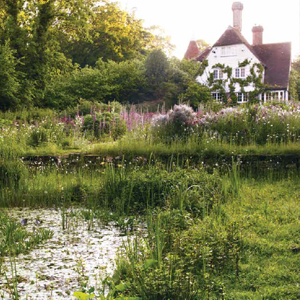

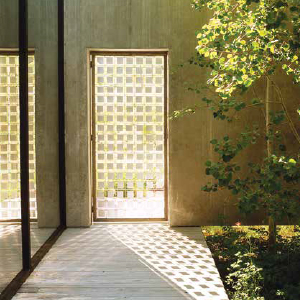

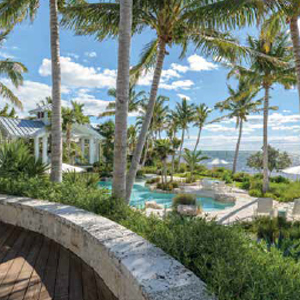

The anti-garden and the paradox of rewilding
Project: The Anti-Garden
Location: Sussex, England
Size: 4 acres
Designer: Jinny Blom
The anti-garden dissolves the rules of a traditional garden. It is ephemeral and abundant, evoking a sense of endless discovery. Though it appears “wild,” with life emerging from every crack in the stone walkways, the anti-garden is neither unmanaged nor passive. It is highly contextualized and intentional—free in spirit yet rooted firmly in place.
Mediating boundaries at the urban-wildlife interface
Project: Ketchum Residence
Location: Ketchum, Idaho
Size: 0.5 acres
Designer: Lutsko Associates
Located just outside the town of Ketchum, this property abuts the rugged foothills of the Sawtooth Mountains and is surrounded by single-family homes. By dissolving the property line into the foothills beyond, Lutsko created the sense that standing on the half-acre lot felt like being on a thousand-acre ranch. The design forges a visual connection with the larger ecosystem by weaving hyperlocal plant species found in the nearby meadows into the immediate landscape around the house.
Designing for beauty and resiliency in the Florida Keys
Project: Coccoloba Garden
Location: Islamorada, Florida
Size: 7 acres
Designer: Raymond Jungles
The vegetation had just begun to fill in and transform the seven-acre coastal property into a landscape teeming with local flora and fauna when Hurricane Irma had made landfall as a Category 4 storm in the Florida Keys. Compared to other properties affected by the storm, the Coccoloba Garden recovered with remarkable speed, thriving again within six months. Raymond Jungles, landscape architect and longtime resident of southern Florida, attributes the site’s recovery to the design’s proliferation of native plants.


Building urban habitat with green roofs
Project: Greenwich Avenue
Location: New York, New York
Size: 3,500 square feet
Designer: Alive Structures
For a top-floor apartment with a 3,500-square-foot roof in the West Village, Majorelle created a garden that mirrors the curated wild of the High Line while capitalizing on the unique set of conditions afforded by an elevated landscape. Eight stories up, the garden floats above the canopy line where gusts of wind, unobstructed by trees, tousle swaths of grasses around mounding perennials and shrubs, creating a sense of movement and topographic relief amid an otherwise static horizon.
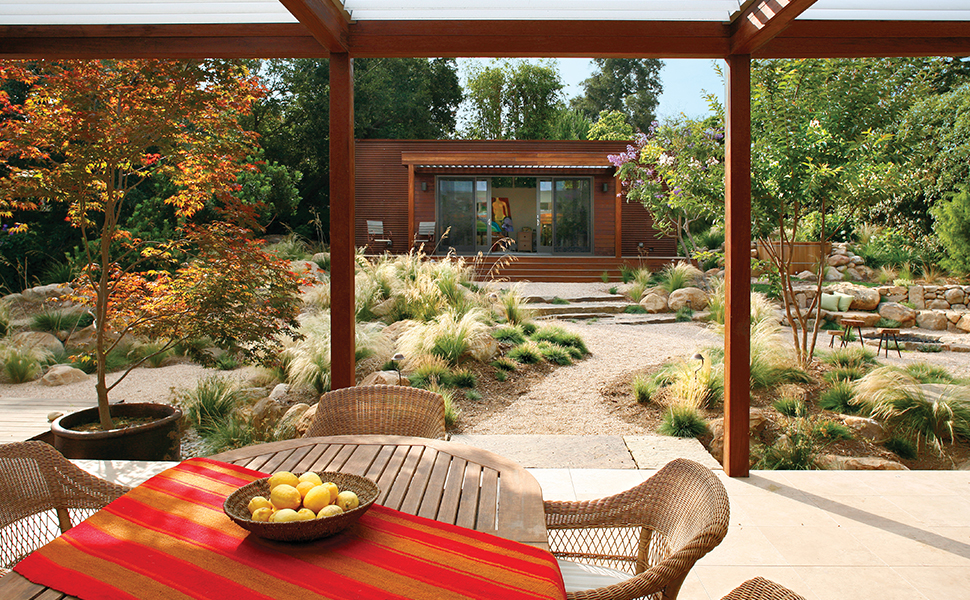

Recycling stone in Santa Barbara
Project: Pedregosa
Location: Santa Barbara, California
Size: 4,800 square feet
Designer: Grace Design Associates
An internationally renowned artist and a Broadway singer, the clients approached Grace with a vision for a contemplative yet lively space, evocative of their Midwestern roots but also appropriate to Santa Barbara’s Mediterranean climate, one that required minimal maintenance and aligned with their creative approach to life and commitment to sustainability. Together, Grace and the clients decided to salvage all the rock uncovered during the excavation and recycle it back into the design of the landscape. The design process was highly collaborative, Grace said, guided by the clients’ artistic expression and deeply rooted in the historic character of the site.
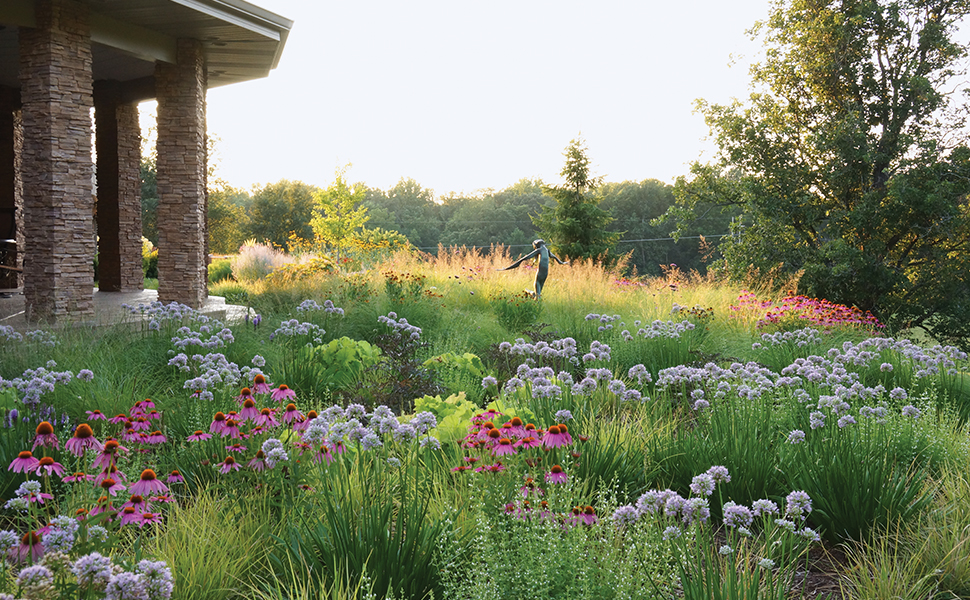

Planting in communities for beauty and longevity
Project: Jones Road
Location: Girard, Illinois
Size: 0.5 acres
Designer: Adam Woodruff
The twenty-thousand-square-foot garden, set against the muted tan and green hues of the rolling woodlands that surround the property, is a vivid abstraction of a meadow. It is reminiscent of a native prairie in composition but with dramatic bursts of color and texture in the spring and summer, followed by the crisp, bronzed patina of leaves in the fall and the stark structure of branches in the winter. It was one of Adam Woodruff’s earliest large-scale residential projects as a landscape designer, and even as it continues to change, the garden remains a poignant illustration of the emotive power of plants.
Publisher : Princeton Architectural Press (October 25, 2022)
Language : English
Hardcover : 256 pages
ISBN-10 : 1616899077
ISBN-13 : 978-1616899073
Item Weight : 2.12 pounds
Dimensions : 7.8 x 1 x 10.3 inches








There are no reviews yet.